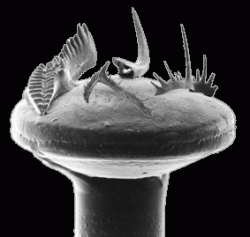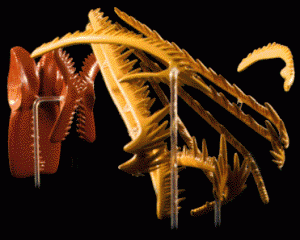Conodonta (Conodonts)
Conodonts are extinct chordates resembling eels, classified in the class Conodonta. For many years, they were known only from tooth-like microfossils now called conodont elements, found in isolation. Knowledge about soft tissues remains relatively sparse to this day. The animals are also called Conodontophora (conodont bearers) to avoid ambiguity.
The eleven known fossil imprints of conodont animals depict an eel-like creature with 15 or, more rarely, 19 elements forming a bilaterally symmetrical array in the head. This array constituted a feeding apparatus radically different from the jaws of modern animals. There are three forms of teeth, coniform cones, ramiform bars, and pectiniform platforms, which may have performed different roles. The organisms range from a centimeter or so[verification needed] to the giant Promissum, 40 cm in length. It is now widely agreed that conodonts had large eyes, fins with fin rays, chevron-shaped muscles and a notochord.
The entire class of Conodonts, or at least what was left of them at the time, are postulated to have been wiped out by the Triassic–Jurassic extinction event, which occurred roughly 200 million years ago.
The "teeth" of some conodonts have been interpreted as filter-feeding apparatuses, filtering out plankton from the water and passing it down the throat. Others have been interpreted as a "grasping and crushing array".
On the other hand, the lateral position of the eyes makes a predatory role questionable.
The preserved musculature hints that some conodonts (Promissum at least) were efficient cruisers but incapable of bursts of speed.
Source: http://en.wikipedia.org/wiki/Conodonts | ||
Virtual museum of the Czech Geological Survey, www.geology.cz, (C) Czech Geological Survey, 2011, v.0.99 [13.12.2011]


![[ENG]](img/vlajka-cr.gif) Česky
Česky 


